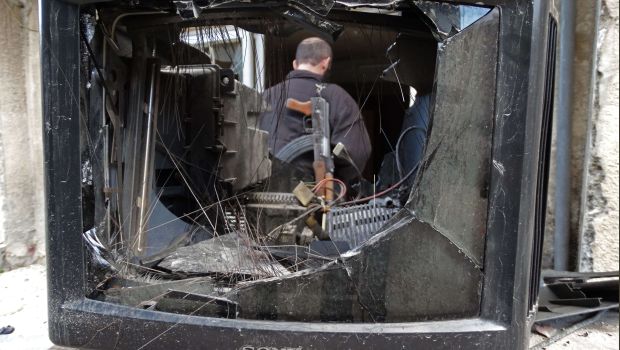
A picture taken on October 18, 2013, shows a rebel fighter standing behind a broken television in the northern Syrian city of Aleppo. (AFP PHOTO / KARAM AL-MASRI)
Beirut, Asharq Al-Awsat—Syrian opposition groups have established prisons in rebel-held areas of the country and are using the same methods of torture as the Assad regime, Syrian activists told Asharq Al-Awsat this week.
The director of the London-based Syrian Observatory for Human Rights, Rami Abdul Rahman, told Asharq Al-Awsat: “Torture is systematically practiced in all the prisons of the Syrian opposition . . . There are a number of cases in which prisoners died after being tortured.”
A Syrian activist on the ground, speaking to Asharq Al-Awsat on the condition of anonymity to protect his identity, confirmed that torture is practiced in these prisons.
One video posted by activists on YouTube showed a detainee who had been whipped by prison guards languishing in an opposition prison in the town of Salqin, on the outskirts of Idlib.
Human Rights Watch has also reported that Syrian opposition militias were engaging in torture and public executions.
“Originally, the function of the opposition prisons was to hold regime loyalists and combatants, but they quickly began to include anyone who opposed the militia’s de facto rule . . . It is likely that the militia commander imprisons anyone who violates his directives,” Abdul Rahman said.
Most Syrian rebel groups, including the Al-Nusra Front and the Islamic State of Iraq and Syria (ISIS), have established independent prisons to hold captured regime soldiers.
According to the Syrian Observatory for Human Rights, ISIS currently holds more than 1,500 people in captivity in the city of Raqqa, the majority of whom are being held on charges related to atheism and spying for Western interests.
Abdul Rahman said that in order to legitimize its prisons, the opposition sets up local bodies comprising village elders, religious leaders, lawyers, and judges, adding this “in no way ensures that they will abide by human rights standards.”
The Syrian opposition source told Asharq Al-Awsat that “ISIS appoints a warden for each of its prisons to oversee prisoner affairs; however, it is the legitimizing bodies, which consist of village elders, religious leaders, and adherents to their cause, who ultimately issue judgments against detainees.”
Another activist on the ground, speaking to Asharq Al-Awsat on the condition of anonymity, said that the majority of militia prisons have been established in former government buildings or schools that have been taken over by the rebels.
“Opposition militias consider these locations to be ideal prisons because of the large number of rooms that can be converted into cells and the ability to arrange areas to meet the needs of the guards,” the activist said.
The most infamous rebel prison is located in Mara’a, in the Aleppo governorate. It holds approximately 200 prisoners, the majority regime loyalists captured during clashes in Aleppo.
The prison falls under the authority of the largest opposition militia in the area, the Al-Tawhid Brigade. The Al-Tawhid Brigade has lately united with six other Islamist rebel groups to form the Islamic Front, which analysts say now represents perhaps the largest and strongest rebel fighting unit on the ground.
Residents from the town of Hayan, north of Aleppo, have reportedly dubbed the two prisons under the command of the leader of the Badr Martyrs Battalion, Khaled Al-Hayani, “Guantanamo” and “Abu Ghraib,” a reference to the conditions prisoners are held in.
